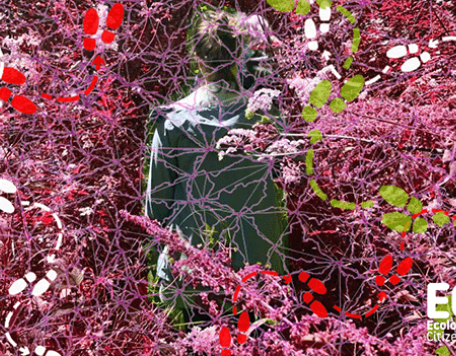© Pint of Science, 2025. All rights reserved.
Data has permeated every aspect of our lives, from health to language and social dynamics. Innovation is great, but how can we, the people, use data to understand ourselves and the world around us? Three researchers from The Alan Turing Institute will take to the stage to explain just that, sharing some of data science's best kept secrets to help you navigate this crazy, data-driven world, a little bit better.
Image by Anne Fehres and Luke Conroy & AI4Media / Better Images of AI / Data is a Mirror of Us / CC-BY 4.0
Image by Anne Fehres and Luke Conroy & AI4Media / Better Images of AI / Data is a Mirror of Us / CC-BY 4.0
Learning the BAYESics - Statistic's most powerful theorem
Emily Alger
(PhD Researcher at The Alan Turing Institute)
We apply statistics every day, for even the most insignificant tasks, without even thinking about it. It helps us understand the world through numbers, from the small things, to the very big things. In this talk, Emily Alger will introduce Bayesian Statistics along with examples of its application and how we can use the underlying Bayes rule in everyday life. Understand how our decisions change and become more accurate as we gain more and more information, and what this means when the stakes are high. We'll follow a group of patients in a simulated trial design – looking at how dose recommendations change as we observe each cohort of patients on the trial.
Invisible grammars – Human vs. AI
Dr Chantal Gratton
(Lecturer of Sociolinguistics at Queen Mary University of London)
Dr Haim Dubossarsky
(Turing Fellow and Lecturer of Natural Language Processing at Queen Mary University of London)
Language consists of thousands of unconscious rules. These rules constitute our ‘mental grammars’ operating silently in our brains while we generate and experience language. Every now and again, we experience linguistic crossroads which cause our brains to return linguistic ‘error’ messages. Things become even more complicated when we consider how AI understands language. By analysing the mistakes AI makes when processing language we can tap into the ‘computational grammar’ that AI exercises to process language and compare it to the human one. This interactive session will have you interrogating your own invisible grammars as well as that of the AI through a series of live demonstrations.
The game we all play: Navigating success through economics and network science
Skyler Xie
(PhD Researcher at The Alan Turing Institute)
Ever feel like life's one big competition, where we are all being scored on who's up and who's down? You're not alone! Skyler's talk dives into this very idea, unraveling the complexities of daily life as a grand competitive arena. But here's the twist: it's not just about winning or losing; it's about creating a fair, inclusive environment for all. Using insights from statistical analysis and network science, Skyler reveals how we can foster an inclusive environment where everyone has a fair chance to thrive, unveiling the dynamics that drive our collective journey.
Map data © OpenStreetMap contributors.
Other The Glitch events
2025-05-20
Paths to Progress: Walking as a tool to reconnect us to our natural world
The Glitch
134 Lower Marsh, London, SE1 7AE, United Kingdom


